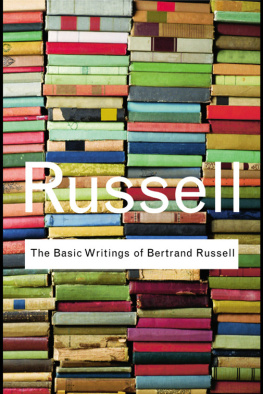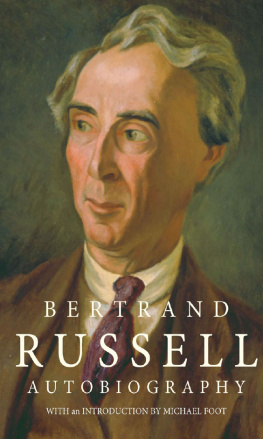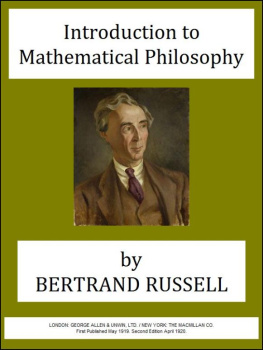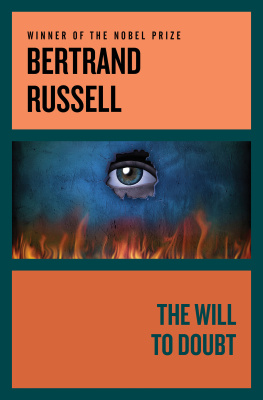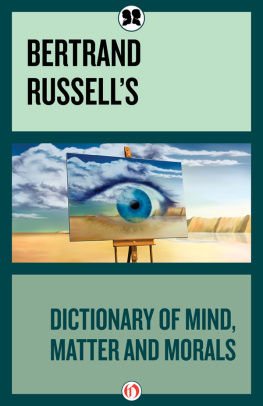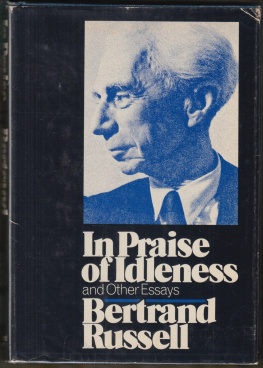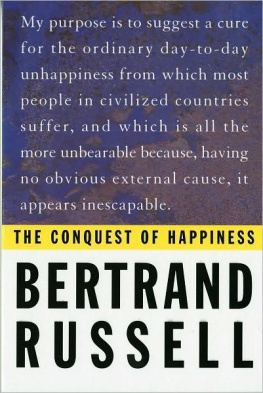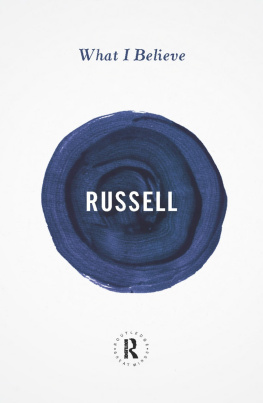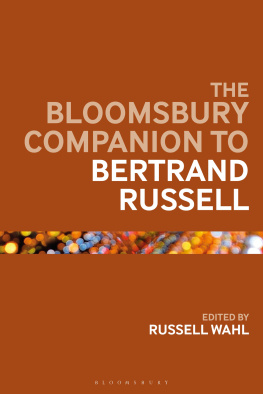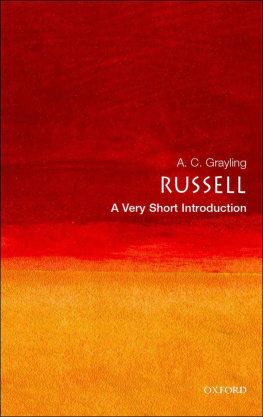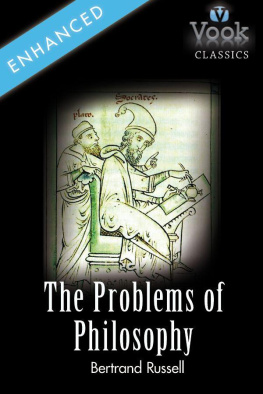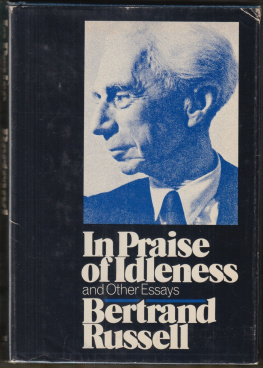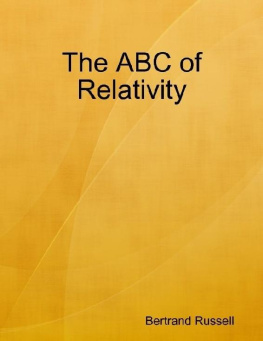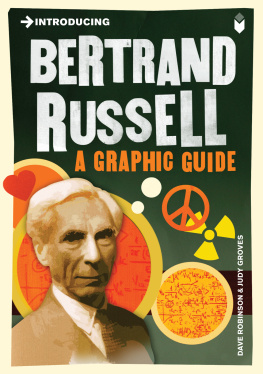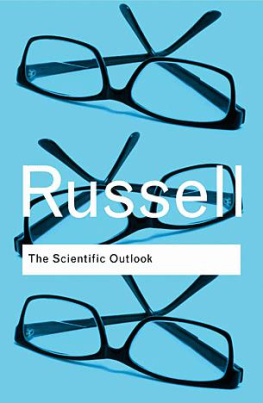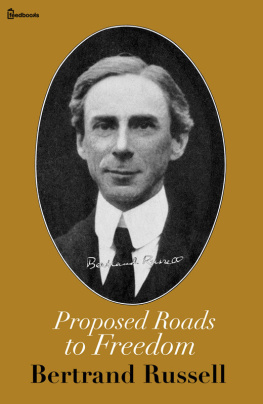Bertrand Russell - The Basic Writings of Bertrand Russell
Here you can read online Bertrand Russell - The Basic Writings of Bertrand Russell full text of the book (entire story) in english for free. Download pdf and epub, get meaning, cover and reviews about this ebook. year: 2009, publisher: Routledge, genre: Science. Description of the work, (preface) as well as reviews are available. Best literature library LitArk.com created for fans of good reading and offers a wide selection of genres:
Romance novel
Science fiction
Adventure
Detective
Science
History
Home and family
Prose
Art
Politics
Computer
Non-fiction
Religion
Business
Children
Humor
Choose a favorite category and find really read worthwhile books. Enjoy immersion in the world of imagination, feel the emotions of the characters or learn something new for yourself, make an fascinating discovery.
- Book:The Basic Writings of Bertrand Russell
- Author:
- Publisher:Routledge
- Genre:
- Year:2009
- Rating:4 / 5
- Favourites:Add to favourites
- Your mark:
- 80
- 1
- 2
- 3
- 4
- 5
The Basic Writings of Bertrand Russell: summary, description and annotation
We offer to read an annotation, description, summary or preface (depends on what the author of the book "The Basic Writings of Bertrand Russell" wrote himself). If you haven't found the necessary information about the book — write in the comments, we will try to find it.
The Basic Writings of Bertrand Russell — read online for free the complete book (whole text) full work
Below is the text of the book, divided by pages. System saving the place of the last page read, allows you to conveniently read the book "The Basic Writings of Bertrand Russell" online for free, without having to search again every time where you left off. Put a bookmark, and you can go to the page where you finished reading at any time.
Font size:
Interval:
Bookmark:

The Basic Writings of Bertrand Russell
'I am in no degree ashamed of having changed my opinions. What physicist who was active in 1900 would dream of boasting that his opinions had not changed?'
Bertrand Russell

Routledge Classics contains the very best of Routledge publishing over the past century or so, books that have, by popular consent, become established as classics in their feild. Drawing on a fantastic heritage of innovative writing published by Routledge and its associated imprints, this series makes available in attractive, affordable form some of the most important works of modern times.
For a complete list of titles visit
www.routledge.com/classics
The Basic Writings of Bertrand Russell
Bertrand Russell
Edited by Robert E. Egner and Lester E. Denonn
With an introduction by John G. Slater

London and New York
This edition first published 1961
by George Allen & Unwin Ltd, London
First published in Routledge Classics 2009
by Routledge
2 Park Square, Milton Park, Abingdon, Oxon OX14 4RN
Simultaneously published in the USA and Canada
by Routledge
270 Madison Ave, New York, NY 10016
Routledge is an imprint of the Taylor & Francis Group, an informa business
This edition published in the Taylor & Francis e-Library, 2009.
To purchase your own copy of this or any of Taylor & Francis or Routledges collection of thousands of eBooks please go to www.eBookstore.tandf.co.uk.
2009 The Bertrand Russell Peace Foundation Ltd
Introduction 1992 John G. Slater
All rights reserved. No part of this book may be reprinted
or reproduced or utilized in any form or by any electronic,
mechanical, or other means, now known or hereafter
invented, including photocopying and recording, or in
any information storage or retrieval system, without
permission in writing from the publishers.
British Library Cataloguing in Publication Data
A catalogue record for this book is available from the British Library
Library of Congress Cataloging-in-Publication Data
Russell, Bertrand, 18721970.
The basic writings of Bertrand Russell / Bertrand Russell.
p. cm. (Routledge classics)
Originally published as: Basic writings, 19031959, London :
George Allen & Unwin, 1961.
Includes index.
1. Philosphy. I. Title.
B1649.R91 2009
192dc22
2008052126
ISBN 0-203-87539-7 Master e-book ISBN
ISBN10: 0-415-47238-5 (pbk)
ISBN13: 978-0-415-47238-8 (pbk)
ISBN10: 0-203-87539-7(ebk)
ISBN13: 978-0-203-87539-1 (Print Edition) (ebk)
Copyright 2008/2009 Mobipocket.com. All rights reserved.
Reader's Guide
This ebook has been optimized for MobiPocket PDA.
Tables may have been presented to accommodate this Device's Limitations.
Table content may have been removed due to this Device's Limitations.
Image presentation is limited by this Device's Screen resolution.
All possible language characters have been included within the Font handling ability of this Device.
The Basic Writings of Bertrand Russell was first published in 1961. Although Russell wrote a preface for it, he had no hand in selecting its contents; that daunting task fell to its editors, Robert Egner and Lester Denonn. The importance of the book lies in the picture it gives of Russell's broad and diverse interests. If any twentieth-century author is a polymath, then Russell is one. Just about the only traditional branch of philosophy he did not write on is aesthetics. In a letter to Lucy Donnelly, written on 19 October 1913, he told her that the pupil she had sent him from Bryn Mawr had turned up and wanted to study aesthetics. Unfortunately, Cambridge had no one who could help her with aesthetics. 'I feel sure learned aesthetics is rubbish,' he wrote, 'and that it ought to be a matter of literature and taste rather than science. But I don't know whether to tell her so.' Little wonder, then, that he never wrote on the subject.
Russell's wide interests developed gradually over the years. From his grandmother he acquired a love of history and an interest in politics in all of its forms. A Russell was expected to take an interest in political matters and to make his opinion known. Russell wrote on a bewildering variety of public controversies, beginning with free trade and women's suffrage and ending with the Kennedy assassination and the Vietnam war. None of these writings was philosophical, although he often used philosophical techniques to demolish an opponent's argument. In his studies at Cambridge he developed his talents in mathematics, philosophy, and economics. His first degree was in mathematics, which he capped with a year's study of philosophy. Undecided whether to pursue philosophy or economics as a career, he finally picked the former and wrote a successful Fellowship dissertation for Trinity College on non-Euclidean geometry, which made use of both of his undergraduate subjects. But he continued to read economics books, which helped him in his researches on German social democracy, the topic of his first book; after that, economics tends to fade from the picture. While a fellow at Cambridge he wondered whether he had any talent for experimental science, so he arranged to spend some time working in the Cavendish Laboratory, but he quickly discovered that he had no such talent. He did, however, keep abreast with the new physics as it developed, at least until the early 1930s. After that there is no evidence that he continued to read original articles as they came out, although right through the 1950s he continued to read books on physics. His interest in science was not confined to physics; he studied it widely enough to be comfortable generalizing about its method; he adopted a version of the scientific method as his guide to philosophizing.
One question to which he applied his scientific method concerned the nature of mind. To prepare himself to analyse mental concepts he read very widely in the psychological literature of his day, especially the writings of the behaviourists. At about the same time, he was becoming increasingly interested in the philosophy of education. This interest arose from the need to provide an education for his own children. None of the available schools seemed suitable, so he and his second wife decided to open their own school. Running a school proved a formidable task. Russell tried to give guidance to his teachers and others by writing on education; his books and articles defend what is called the progressive view of education.
His school made a heavy drain on his resources, which he had to make up by writing and lecturing for payment. During the 1920s he regularly made lecture tours of the United States, where he was paid much better than elsewhere. And he accepted nearly every offer to write for cash. For a long period, to cite one remarkable example, he wrote a short article every week for the Hearst newspapers. These little pieces usually took some catchy topic'Who May Use Lipstick?' or 'Do Dogs Think?'and discussed it wittily. In a few of them there is quite serious philosophical argument, but mostly they are just fun. As the examples suggest, they range widely, and accordingly add greatly to the sweep of Russell's writings. What is really impressive about them is their erudition; Russell, it seems, never forgot a word he had read.
Next pageFont size:
Interval:
Bookmark:
Similar books «The Basic Writings of Bertrand Russell»
Look at similar books to The Basic Writings of Bertrand Russell. We have selected literature similar in name and meaning in the hope of providing readers with more options to find new, interesting, not yet read works.
Discussion, reviews of the book The Basic Writings of Bertrand Russell and just readers' own opinions. Leave your comments, write what you think about the work, its meaning or the main characters. Specify what exactly you liked and what you didn't like, and why you think so.

